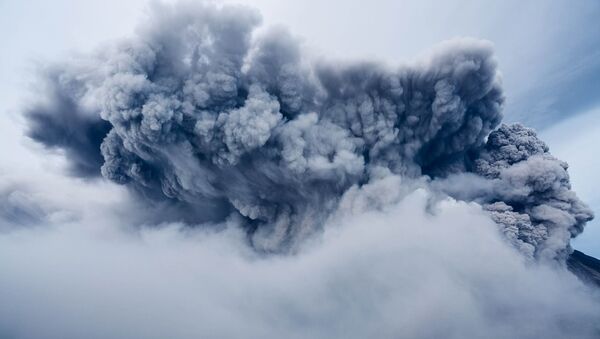A new study claims that stone tools discovered in Dhaba, north-central India, suggest that ancient humans were able to adapt to drastically-altered conditions in the wake of the Toba volcano eruption at the site of present-day Lake Toba in Sumatra, Indonesia, some 74,000 years ago.
The research, “Human occupation of northern India spans the Toba super-eruption ~74,000 years ago”, published on 26 February in Nature Communications, looks at a progression of stone implements from between 25,000 to 80,000 years ago found in Middle Son Valley near Dhaba.
Researchers from the University of Queensland, Australia, examined stone tools found at a site in Dhaba, in the Middle Son River Valley, Central India.
— Eddie Du (@Edourdoo) February 27, 2020
Their findings show humans arrived at the site at least 80,000 years ago, and remained there until at least 48,000 years ago. pic.twitter.com/WBiyvPJvYK
"Populations at Dhaba were using stone tools that were similar to the toolkits being used by Homo sapiens in Africa at the same time," explains archaeologist Chris Clarkson from the University of Queensland, who led the study.
Max Planck Institute anthropologist Michael Petraglia was quoted by National Geographic as saying:
“The big theory out there was that the Toba supereruption created a volcanic winter, so it led to glaciation, it re-sculpted ecosystems, [and] it had tremendous impacts on the atmosphere and landscape.”
The Dhaba site, claim the scientists, shows no evidence to support the theory for such a cataclysmic impact.
“It’s much more subtle than what people had imagined. It doesn’t mean there’s no ecological change, but these hunter-gatherers would have been able to adapt to the changes,” insists Petraglia.
Although no fossil remains of Homo sapiens were found at Dhaba site, rocks shaped into sharp tool-like objects were unearthed, with experts claiming these are consistent with artifacts earlier found in Australia and the Arabian Peninsula, dating between 48,000 to 80,000 years ago.
The more recent upper layers of sediment, dating back 25,000 years, produced smaller stone blades.
The study, claim its authors, offers evidence that the resilient community that left behind the artifacts survived the ancient eruption and lasted at least another 50,000 years. The same research suggests that ancient Homo sapiens migrated out of Africa earlier than generally believed. The current existing estimates suggest the time frame as being between 60,000 and 70,000 years ago.
The research is based on previous studies carried out in 2007 at a different archaeological site in southern India - a country located at a critical geographic crossroads for studying dispersal of Homo sapiens out of Africa and into Asia and Oceania.
It was here that some of the archaeologists involved in the current study found stone tools from before and after the eruption, thus seeming to “connect the dots” between India, southeast Asia, and Australia for modern human dispersal.
"Modern human dispersal out of Africa, and more importantly east of Arabia, must therefore have taken place before [65,000 years ago]," the authors of the study write.
"The Dhaba locality serves as an important bridge linking regions with similar archaeology to the east and west."
Whatever populations did reside in Dhaba, the new evidence seems to suggest they were not nearly wiped out by the Toba eruption, even though their survival must have been challenged in other ways, as studies shown them to have contributed negligibly to the modern gene pool.
"The archaeological record demonstrates that although humans sometimes show a remarkable level of resilience to challenges, it is also clear that people did not necessarily always prosper over the long term," summarizes Michael Petraglia.




